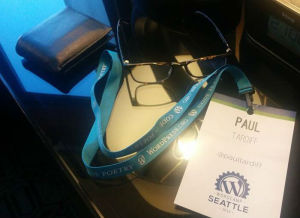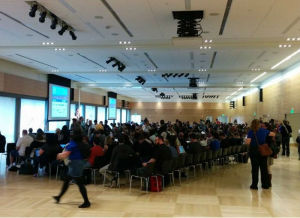 Having never been to a WordCamp or Seattle before, I was excited to visit this beautiful city in the Pacific Northwest and to get a better understanding of the WordPress community. I wanted to better understand WordCamp Seattle and the future of WordPress from key WordPress
Having never been to a WordCamp or Seattle before, I was excited to visit this beautiful city in the Pacific Northwest and to get a better understanding of the WordPress community. I wanted to better understand WordCamp Seattle and the future of WordPress from key WordPress
influencers like Paul Clark, Andrew Nacin and Jenifer Bourn. I didn’t want to just make assumptions, so I put on my Inspector Gadgets glasses and planned interviews with Paul Clark and Andrew Nacin, both speakers at WordCamp Seattle and important players on the core development of WordPress; while Jennifer Bourn is the perfect poster child for the power and success many people find using WordPress, with its simple and free access to managing a website and its content.
 Andrew Nacin (who goes by Nacin) is one of the Lead Developers on WordPress and is your one stop source for anything and everything WordPress. If you want to know about the direction of the organization, how it works, and what to expect, then he is your guy and precisely the reason I interviewed him. Think of him as the leading authority on WordPress. Paul Clark is a WordPress core contributor, Tedx speaker, and the Director of Recruiting at 10up.com. He is viably one of the most important people involved with WordPress who was in attendance at Seattle WordCamp. Jennifer Bourn, founded and owns BournCreative.com, a comprehensive digital agency that is 100% WordPress focused. Her direct relationships, advocacy and use of WordPress in her business, makes her the perfect resource for anyone (like myself) looking to utilize, understand and find success with WordPress.
Andrew Nacin (who goes by Nacin) is one of the Lead Developers on WordPress and is your one stop source for anything and everything WordPress. If you want to know about the direction of the organization, how it works, and what to expect, then he is your guy and precisely the reason I interviewed him. Think of him as the leading authority on WordPress. Paul Clark is a WordPress core contributor, Tedx speaker, and the Director of Recruiting at 10up.com. He is viably one of the most important people involved with WordPress who was in attendance at Seattle WordCamp. Jennifer Bourn, founded and owns BournCreative.com, a comprehensive digital agency that is 100% WordPress focused. Her direct relationships, advocacy and use of WordPress in her business, makes her the perfect resource for anyone (like myself) looking to utilize, understand and find success with WordPress.
 It’s very easy for companies to say or guess what the next big thing is, while it’s another thing to actually investigate and present truthful and compelling insight that your customers and readers can use. You should know what’s down the road and especially with a platform like WordPress, which currently runs over twenty percent of all the websites in the world. This information is not only important for InMotion Hosting to continue being one of the best web hosting providers… but it’s important to our customers who are looking to for one of the best content management systems [CMS] like WordPress to run their blog or website.
It’s very easy for companies to say or guess what the next big thing is, while it’s another thing to actually investigate and present truthful and compelling insight that your customers and readers can use. You should know what’s down the road and especially with a platform like WordPress, which currently runs over twenty percent of all the websites in the world. This information is not only important for InMotion Hosting to continue being one of the best web hosting providers… but it’s important to our customers who are looking to for one of the best content management systems [CMS] like WordPress to run their blog or website.
 What makes WordPress so great is the dedication of the people who contribute to it for free. Yes, I said free. It’s this freedom that has allowed anyone to help innovate WordPress and because of this, it will continue to become better and better for anyone and everyone across the world. WordPress is leveling the playing field for anyone to publish and own their content online and this would not have been possible without the dedication to contributing, which is at the core of WordPress. Don’t just take my word for it, but check out what Andrew Nacin and Jennifer Bourn had to say:
What makes WordPress so great is the dedication of the people who contribute to it for free. Yes, I said free. It’s this freedom that has allowed anyone to help innovate WordPress and because of this, it will continue to become better and better for anyone and everyone across the world. WordPress is leveling the playing field for anyone to publish and own their content online and this would not have been possible without the dedication to contributing, which is at the core of WordPress. Don’t just take my word for it, but check out what Andrew Nacin and Jennifer Bourn had to say:
“It’s really easy to get involved in anyway number of ways. Most people think that it is just about writing codes, but it’s so much more than that…whether it’s designing, testing, writing documentation or support. There are more people working on documentation today, than there are working on code, which is a really cool thing to see.” (Andrew Nacin)
“When people say contributing to WordPress, people automatically think that you need to be a developer or that you have to be some ridiculous genius to contribute, because that is what everyone talks about. What people don’t talk about, is that you can give back to WordPress or to the community by just getting involved with your local WordPress community. You can answer questions in the support forums or using your blog. But sometimes the easiest is about finding your local community and just get your feet wet and then if there is a WordCamp in your area, then get involved with that.” (Jennifer Bourn)
Jennifer also went on to say that she would not be where she is today without the support she received from the WordPress community when she was starting out, all the way til today. For this reason, she believes that this, “breeds that need to pay it back and give it forward” and why she is motivated to give back to the WordPress community. It’s clear that this charity of contributing has made WordPress what it is today and the reason I asked the question, “Where do you see yourself and WordPress in 10 years?” and here are the responses:
“…there is a lot that we can still do to make the editing, customization and writing experience better. A lot of my work has gone into building a sustainable platform for contributors and in my case, most of my work has been on the WordPress architecture. I don’t know where I will be in 10 years, but I can say that we are just getting started.” (Andrew Nacin)
“I like to say that we make solid products for people and not for computers and as long as WordPress is helping people and solving problems for people, then I would continue to do it.” (Paul Clark)
“I would like to be able to contribute more and find a more meaningful way to give back more of my time and getting involved. Whether it’s starting a WordCamp in our area and giving back because of what WordPress has afforded us to do. I think that if WordPress continues to have the support and growth that it has over the past few years, it will undeniably be the go-to resource for publishing online. I think it is going to just continue to grow and the core will become much simpler to use and dominate the online landscape if the support continues to be what it is today.” (Jenifer Bourn)
It’s clear that the support is there and with automatic updates of core making WordPress even more secure from hackers, it is only adding to its long term viability as one of the go platforms to manage you website’s content. As Andrew Nacin put it:
“You should have to go through the pain of updates if the system can do that for you. In an ideal word, WordPress would update nightly like say Google Chrome does. “
It’s truly great that WordPress has core automatic updates from a hosting standpoint, but what about automatic updates for major releases or plugins? Sometimes plugin authors can break things in their updates, causing a lot of headaches for people. With more than 30 thousand plugins, this seems like a daunting task and a possible downside  to the continued innovation of the platform. After speaking with all three interviewees, it seems that the clear consensus is not one way or the other, rather there should and most likely will be an opt-in feature for the consumer and plugin developer in the future. As Andrew puts it, “though it is going to be incredibly difficult along the way, there will be some wins that will make it easier for users and developers.” and “we are trying to leverage automatic updates for plugins and themes for fixing security issues in those plugins and themes.”
to the continued innovation of the platform. After speaking with all three interviewees, it seems that the clear consensus is not one way or the other, rather there should and most likely will be an opt-in feature for the consumer and plugin developer in the future. As Andrew puts it, “though it is going to be incredibly difficult along the way, there will be some wins that will make it easier for users and developers.” and “we are trying to leverage automatic updates for plugins and themes for fixing security issues in those plugins and themes.”
 I think it’s fair to say, that WordPress will continue to innovate, become simpler to use at the core, more secure and so long as people continue to support it, it will be a force to be reckoned with. The beauty of WordPress, is that not one person owns it and it is based on the values of equal access to publishing information and content. We need organizations like WordPress, which make it possible for anyone to publish online and share with the world what is happening in their lives, because the purpose of the internet is to give us all equal access to the world. As a hosting company employee and blogger myself, it is this type of ‘philanthropy of information’ that makes the internet great and the reason we need to protect it and make sure it remains open to anyone and everyone who has a message to share. Paul Clark, in response to a question I asked him regarding his speech “How WordPress Saves Lives and Moves Governments” said that WordPress is essentially uncontrollable and that’s because:
I think it’s fair to say, that WordPress will continue to innovate, become simpler to use at the core, more secure and so long as people continue to support it, it will be a force to be reckoned with. The beauty of WordPress, is that not one person owns it and it is based on the values of equal access to publishing information and content. We need organizations like WordPress, which make it possible for anyone to publish online and share with the world what is happening in their lives, because the purpose of the internet is to give us all equal access to the world. As a hosting company employee and blogger myself, it is this type of ‘philanthropy of information’ that makes the internet great and the reason we need to protect it and make sure it remains open to anyone and everyone who has a message to share. Paul Clark, in response to a question I asked him regarding his speech “How WordPress Saves Lives and Moves Governments” said that WordPress is essentially uncontrollable and that’s because:
“It can be installed on any computer, on any server, on a shared host, or say from a closet in China to bypass firewalls… it makes it very difficult to control and for that reason, there are even WordPress plugins out there that use WordPress, its ease of use and adaptability to get around repressive governments.”
This is relieving, because often times platforms and even search engines will fail to uphold the values of the internet that have made them rich in the first place. I believe that the access to information and the act of publishing should be free and accessible to all and not a minority or the highest bidder. WordCamp showed me the great possibilities the internet can provide and its power to bring people together over an idea that is worth spreading.
If you want to read the rest the interview questions, the response and bios for Paul Clark, Andrew Nacin and Jennifer Bourn from WordCamp Seattle, please click here.